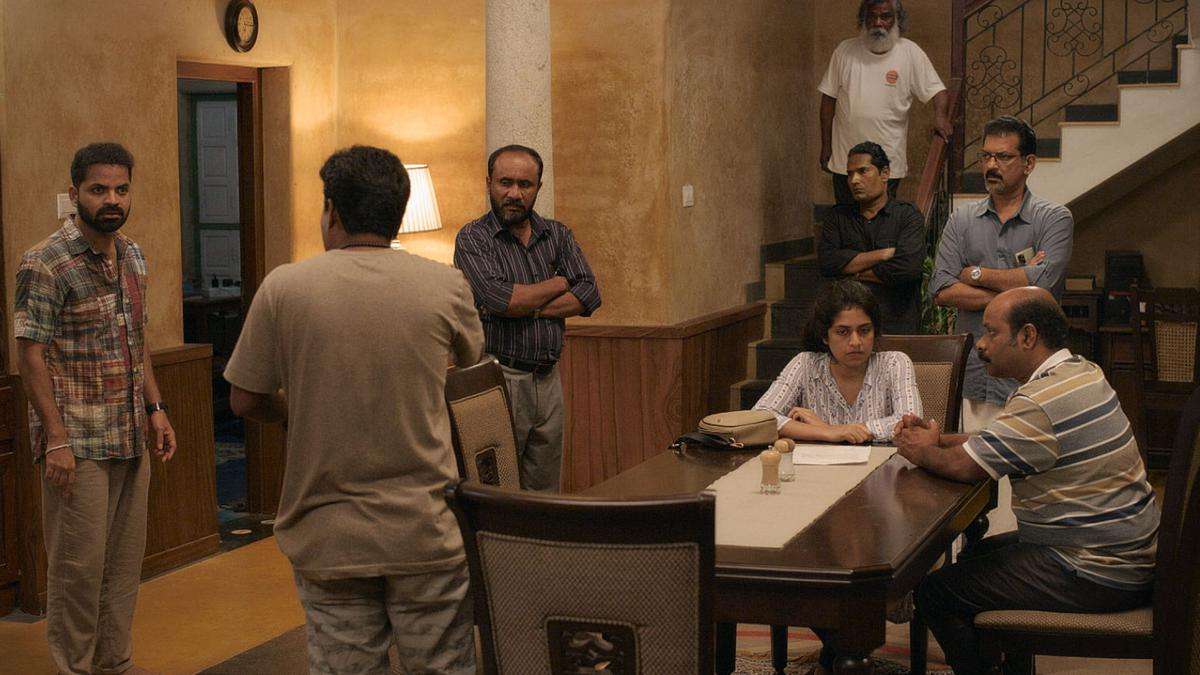In his debut feature, Aattam (The Play), Anand Ekarshi culls extraordinary tension from the finely observed dynamics among a theatre troupe of twelve men and a woman. Above everything, Ekarshi, a seasoned theatre director, has an ear for impeccable, razor-sharp dialogue delivered by an ensemble that keeps pulling at and testing our snap, quick judgments, and the prejudices we spew. These are men with regular but not very well-paying jobs. Among them, someone is a gas station attendant, one is a temple priest, and another an ex-news editor. The sole woman, Anjali (a charismatic, scene-stealing Zarin Shihab), is in an illicit relationship with Vinay (Vinay Forrt, superbly channeling the limits of male delusion), who has quietly initiated a divorce from his spouse.
No one in their troupe knows, and Vinay, as Anjali points out, has always shied away from publicly acknowledging the relationship. They have been friends since school, and it is implied they have been in a relationship even before his marriage. Vinay has long kept her hanging on his promise he’d marry her soon, as soon as he is separated from his wife. Gradually, Ekarshi exposes how Vinay has tailored the relationship he has with her to suit his ends and comes to override what she might have to say.
For most of the film, he speaks for her in what apparently begins as a gesture of concern and shielding her from hurt but soon spins out into an inflated exercise in egoism. To leaven things for her, he chips away into the very space of expression which she has a right to both own, assess and decide her way through.
Ekarshi’s screenplay excels particularly in capturing the ways men domineer over and hijack into the narratives of women. Although the film opens with a sense of ease, Anjali seems to be experiencing around a bunch of men, there is a scattering of discernible nuggets of misogyny in how they view her and respond to the manner of her dressing or demeanor. A celebratory night out is gifted by foreign connections of Hari (Kalabhavan Shajohn), a film actor who has recently joined the troupe, on being impressed with one of their productions. Albeit Hari has brought in visibility, audiences, and more money for the group, Vinay is displeased as his leading role has gotten hogged by Hari.
It is a role he ascended to after years of performing in the group, and Hari swooped in no time, scooping it up. In an early scene with the director of the group, Vinay shares his anguish, illuminating the friction between him and Hari and why he is set against him as the film unravels. So, while Anjali confides in him about being sexually harassed late night at the celebration, she tells him she believes it is Hari who did it but insists she didn’t see him. Since his tussle with Hari is familiar to the group, he assigns someone else to disseminate the news of the episode. However, he never misses to push for the allegation being charged against Hari.

Ekarshi structures Aattam as a bristling, masterfully taut chamber drama; Mahesh Bhuvanend’s editing doesn’t allow for a single dull moment. The pace is furiously tight and never slackens. The chorus of male voices bickering among themselves about the right course of action to be taken in the circumstance, convinced they are perfectly capable of integrity and compassion in dealing with Anjali even as each of them brings up the usual questions of doubt, is broken only in the musically accented interlude-like sequences. The start of the deliberations, most of which take place around a dining table, is cued by the explosive sound of a coconut having plummeted on the roof.
It doesn’t take much for the men’s façade of performative geniality to fall apart, revealing the worst excesses of male conditioning, and endless questions are raised. Why did she stay quiet for an entire week before coming forward? As artists, can’t we do better than expelling the accused? The interrogation only gains in its bewildering ridiculousness undercut with depressing familiarity. Every judgment doled out against Anjali is drawn from the stock of casual misogyny, one ironically justifying another’s comments on account of them being from an older generation who hasn’t been schooled in correct etiquettes, whose own chauvinism couldn’t get more overstated.
In this ruthless dissection into a woman’s claim is planted an almost thrilling exposé of male hypocrisies, coming apart through the brilliantly charged, incisive dialogues. Each actor is both individually perfectly pitched as well as fits seamlessly into the larger ensemble, as the space between the truth and lie becomes wildly, heatedly contestable. There’s acute condescension, great posturing at righteousness and ethics, but also barely disguised counter-allegations of the woman having invited the molestation upon herself for drinking with other men.
While the onus falls eventually on the woman to narrate the entirety of her story, the demand for proof is never too far behind. It is telling that the allegedly accused is almost wholly absent in these sections. DP Anurudh Aneesh lets the viewer into the debates as a fly on the wall. There are no grand movements, just a rigorous commitment to unpacking and taking a scalpel through the conversations. As they assuage Anjali that her will matters most, they barely leave her any option, having checked and determined every consequence themselves refracted through the economics of agenda. At times, the level of gaslighting is almost unmasked in its brazen display.
Also, Read: White Plastic Sky (2023) ‘MAMI Film Festival’ Review
Ekarshi’s lens is scathing in its minimalism, leading to one of the most breathlessly orchestrated final acts, where everyone is a suspect, and none is let off the hook. The scope for disruptive, provocative suggestions is audaciously split open.
Overall, Aattam is a fiercely intelligent film that makes no bones about male control, as well as being sharp enough to cast its critical gaze wide across the board.
★★★★
Aattam had its Asia Premiere at the JIO MAMI Mumbai Film Festival 2023.




![The Eel [1997]: A Fascinating Tale of Social Isolation and Redemption](https://79468c92.delivery.rocketcdn.me/wp-content/uploads/2016/06/Eel-2-768x384.jpg)
![Pierrot le Fou [1965] Review: An Internal Conflict](https://79468c92.delivery.rocketcdn.me/wp-content/uploads/2019/02/Pierrot-le-fou-HOF1-768x432.jpg)


